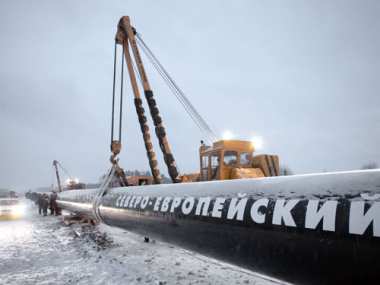A week after Russia's Gazprom cut back gas supply into Ukraine, a growing shortage in Europe has resulted in calls to re-open shut-down nuclear power plants.
 |
| Gazprom's Nordstream pipeline that delivers to Germany and the Netherlands |
Citing the possibility of a national crisis, Bulgarian President Georgi Parvanov said work would start immediately to prepare to restart the third reactor at the Kozloduy nuclear power plant.
The generating unit, in common with Kozloduy 4, was closed on safety grounds as part of Bulgaria's accession agreement to the European Union. However, extensive refits including new control systems led the International Atomic Energy Agency and the World Association of Nuclear Operators (WANO) to separately conclude the reactors meet all necessary international standards for safe operation. WANO said in January 2007 that "no technical reasons exist for the early closure of units 3 and 4." Article 36 of the Bulgaria's accession agreement says that in a national crisis the country has the right to resume power generation using the units.
Similarly, in Slovakia, prime minister Robert Fico said he "could imagine" the re-opening of a shut-down reactor at Jaslovske Bohunice, "should Slovakia continue to be a hostage of this bilateral conflict between Russia and Ukraine." Another parallel with Bulgaria and the Kozloduy plant is the upgraded status of the shut-down Bohunice units, which have had new emergency core cooling and control systems. The IAEA said that "all safety issues identified earlier... have been appropriately addressed." Slovakia is currently receiving none of the gas it usually sourced from Gazprom and has described the situation as an energy emergency.
In the Czech Republic, President Václav Klaus used his position as the current President of the European Commission to issue a joint statement. The shortage of gas supplies has come in "clear contradiction to the reassurances given by the highest Russian and Ukrainian authorities to the European Union."
Klaus called the situation completely unacceptable and demanded that gas flows through Ukraine be restored immediately.
Eleven European countries besides Ukraine have now reported varying difficulties with gas supplies: Austria, Bosnia, Bulgaria, Croatia, the Czech Republic, Greece, Hungary, Macedonia, Poland, Romania and Turkey. Rate of supply is reported as low in France, Germany and Italy.
The Gas War
A negotiating impasse came with a proposed price of $201 per 1000 cubic metres for 2009 and a debt that had built up to $2 billion by the end of 2008. When the 2008 contract period ended on 1 January, Gazprom cut off its supplies for use in Ukraine. However, contracts for gas transport are separate from those for supply, meaning that Naftogaz Ukrainy was still obliged to allow supplies for central and western Europe to flow. |






_15863.jpg)







